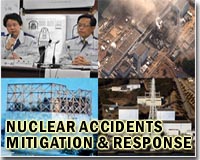| . |  |
. |
Tokyo (AFP) April 22, 2011 Japan's Prime Minister Naoto Kan said Friday it is his "destiny" to serve during "a crisis within a crisis" as the tsunami and quake-hit nation battles the worst nuclear accident since Chernobyl. The Fukushima power plant has been leaking radiation since it was hit by the massive March 11 quake and tsunami in Japan's worst post-war disaster which has wiped whole towns off the map and left more than 27,000 people dead or missing. "This crisis is not just one crisis. This is a crisis within a crisis," Kan told a news conference. "Our country has been faced with a lot of issues for the past 20 years. Economic growth has been in the doldrums. The number of suicides has not declined" and stayed above 30,000 annually for years, he said. "We have been experiencing a crisis. Then the crisis of the great disaster and the nuclear power accident came. We regard this crisis as happening within a crisis. And we are required to resolve the two crises at the same time." The cabinet Friday approved a four-trillion-yen ($49-billion) special budget to help reconstruction and Kan said it was likely that the government would need to make a bond issue to finance a second supplementary disaster budget. "The dominant view -- and I believe it myself -- is that the second extra budget for full-fledged restoration will be sizeable," Kan said, adding the government hoped to finish building 30,000 temporary housing units by the end of May. "It will be necessary to issue Japanese government bonds to cover the funds needed for reconstruction." Japan has the industrialised world's biggest debt, at around 200 percent of gross domestic product, after years of pump-priming measures by governments trying in vain to arrest the economy's long decline. The government said the first extra budget would be financed by diverting some funds originally aimed at supporting the pension programme and child allowances and slashing plans to cancel highway tolls. Japan has said the cost of rebuilding could be as much as 25 trillion yen. Asked whether he was willing to step down once the path to recovery has been laid out, Kan said it was his "destiny" to serve at a time of such disasters. "I take it as a kind of destiny, in a sense, that I serve in the prime minister's position at a time when we face the great earthquake and the nuclear accident," said Kan, who was facing falling approval ratings and an internal party revolt when the quake hit. "In this sense, I want to pave the way to rebuild and revive the country and overcome the two crises. And if the path is coming into view, I think I will be satisfied as a politician."
earlier related report It was the second time that the royal couple visited an area directly hit by the March 11 quake and tsunami, which left some 27,000 people dead or missing along the Pacific coast northeast of Tokyo. They plan to travel closer to the hardest-hit prefectures of Miyagi, Iwate and Fukushima in the coming weeks as the imperial family plays its constitutional role as a symbol of the nation's unity. The 77-year-old emperor and his wife, 76, travelled to the city of Kitaibaraki, some 150 kilometres (90 miles) northeast of the capital, where five people died and another went missing in the disaster. They offered a silent bow toward the sea when they were told at a fishing port that one fishery cooperative worker went missing when a breakwater collapsed, according to television footage. "How many metres did the tsunami measure in height? What is the most difficult thing now?" they were heard asking officials. The couple then visited a city gymnasium where about 40 evacuees were staying, talking to each of them. Emperor Akihito consoled a 72-year-old man, whose wife had died at the centre, saying: "It was quite unfortunate. You must be missing her very much." A 74-year-old man told the emperor: "I am staying here because I am scared of aftershocks," according to the daily Yomiuri. "I felt calm when I saw his majesty's face. Tears came to my eyes," it quoted him as saying. Kitaibaraki's fishing port resumed operations Wednesday amid fears of pollution as the Fukushima Daiichi nuclear power plant, 70 kilometres (40 miles) to the north, continues leaking radiation into the air, sea and ground. The emperor and empress were offered fried conger eels and flounders cooked in soy sauce, popular sea delights in Japan, for lunch at the port, Kitaibaraki mayor Minoru Toyoda told Japanese media. The couple expressed concern over the area being harmed by rumours about radioactive pollution of fishery products, Toyoda said.
Share This Article With Planet Earth
Related Links Bringing Order To A World Of Disasters A world of storm and tempest When the Earth Quakes
 Japan PM declares no-go zone around nuclear plant
Japan PM declares no-go zone around nuclear plantTokyo (AFP) April 21, 2011 Japan on Thursday banned people from going within 20 kilometres (12 miles) of the tsunami-hit Fukushima nuclear plant, which has been leaking radiation for nearly six weeks. The ban, which gives legal weight to an existing exclusion zone, comes after police found more than 60 families living in the area and residents returning to their abandoned homes to collect belongings. Prime Ministe ... read more |
|
| The content herein, unless otherwise known to be public domain, are Copyright 1995-2010 - SpaceDaily. AFP and UPI Wire Stories are copyright Agence France-Presse and United Press International. ESA Portal Reports are copyright European Space Agency. All NASA sourced material is public domain. Additional copyrights may apply in whole or part to other bona fide parties. Advertising does not imply endorsement,agreement or approval of any opinions, statements or information provided by SpaceDaily on any Web page published or hosted by SpaceDaily. Privacy Statement |